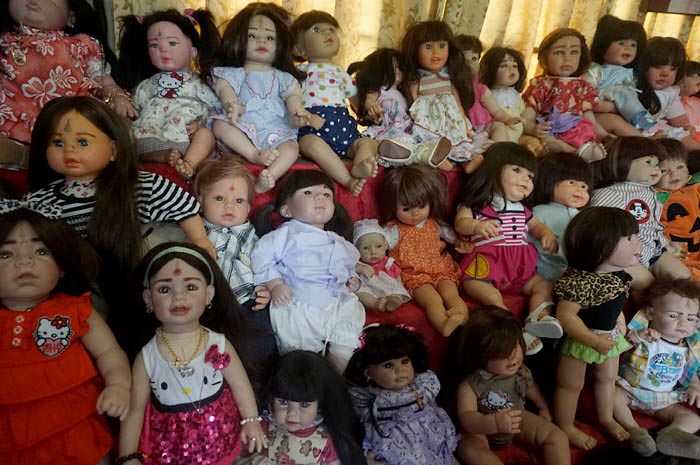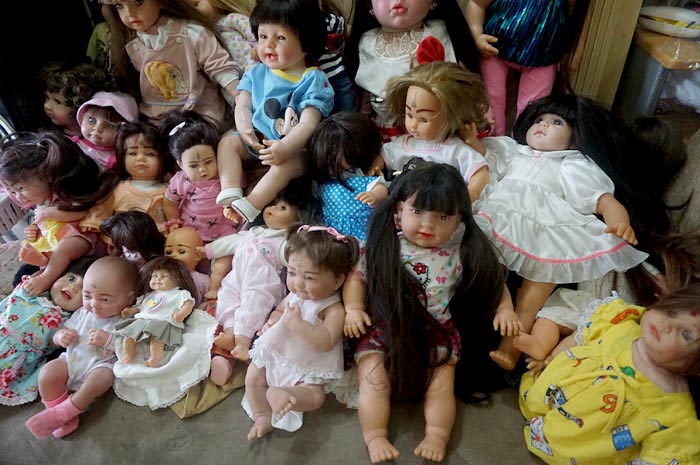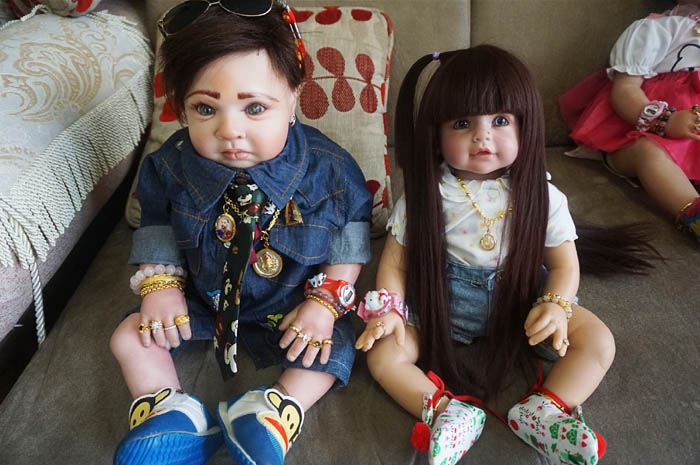WALKING INTO MAMA NING’S LAIR on the outskirts of Bangkok, I was slightly disturbed by the body parts scattered around her house – a headless toddler, little limbs, bits of hair and tiny clothes packed into buckets.
The body parts? Don’t mind those, said Chutipat Siripoh, one of Mama’s acolytes, who greeted me at the door. All those little parts, she said, would be put together to make a Look Thep or “Child God,” a doll said to be powered by a living soul, that some believe can change people’s lives.
Chutipat, a petite woman in her twenties, had traveled three hours from Nakhon Sawan province to see Mama Ning add real human hair to her doll. She was all too eager to welcome me to the doll house.
It’s the home and workshop of Mananya Boonmee, now called “Mama Ning,” a woman who started out selling purses.
Three years ago, desperate for a change in her life, Mama Ning created “Petch,” Thailand’s first Look Thep. A few haunted dolls and some help from social media later, the word is out.
Today these factory-manufactuerd dolls have been adopted by celebrities and individuals who earnestly believe that they will bring them blessings and wealth.
“Look Thep is a doll who is alive.” Mama Ning explained. “I created a soul to live in the doll, and owners can raise them as their own children, taking them out in public, just like a normal kid.”
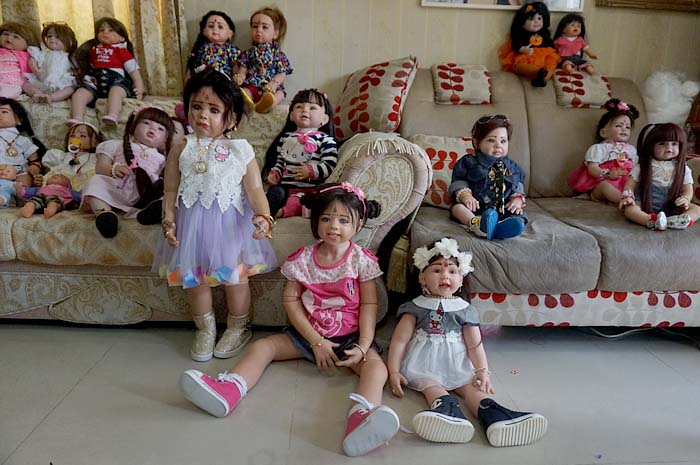
White magic
Given Thailand’s history with black magic, it’s commonly misunderstood that Look Thep involves a dead child’s soul or even contains human remains, similar to the infamous Kumanthong, a magic charm prepared by frying a fetus and wrapping it in gold foil. While they are worshipped for the same reason, Mama Ning’s secret ceremony calls upon a Hindu goddess to create a new infant soul to bring the doll to life. No necromancy here.
“I put life essence into the dolls … like seeds,” Mama Ning said, while refusing to disclose the ingredients she uses to forge Look Thep. “I chant prayers and then style the doll’s hair, but I insist there is no black magic involved. I follow the Dhamma way.”
Mama Ning is a dedicated Buddhist, but she has also been worshipping Parvati, the Hindu goddess of fertility, since she was young. It is Parvati who awakens a Child God.
“I consider myself the ‘body’ of Parvati Goddess. I have the goddess in my heart, so I created the Look Thep which means my ‘Child God.’”
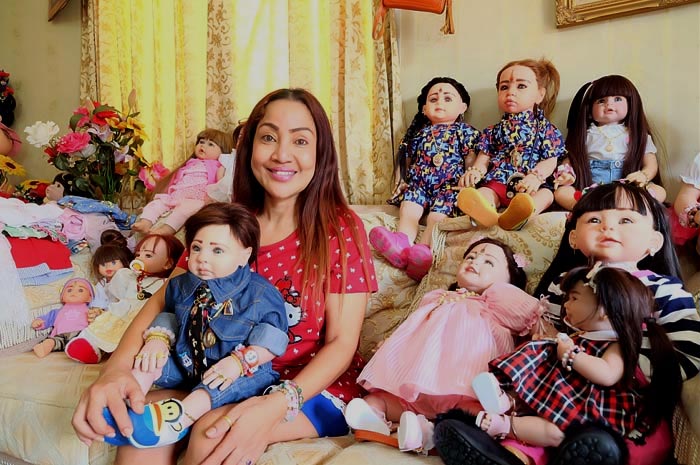
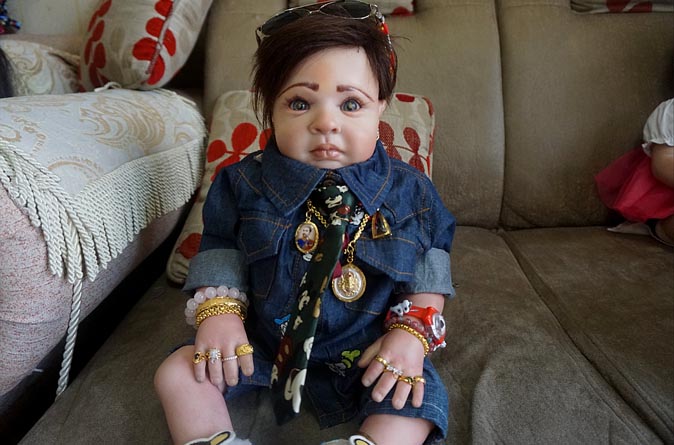
First of his kind
Petch was her first and favorite doll because she infused it with the spirit of her son. Three years ago, when he was 17, she was at her wits’ end because of his bad boy behavior. So Mama Neng placed the amulets and charms he loved inside the doll, and it awakened. She starting treating Petch like her own child, carrying him around and taking him to make merit at the temple, in the hope that her teen at home would change his ways.
According to Mama Ning, it worked.
Her son started improving his life and eventually moved out and got married. Now Petch is sporting gold rings on every finger as a reward for bringing in the money for Mama, and their relationship has become stronger than ever.
“For me, when I’m lonely, I dress him up. I talk to him. When I sold purses, he helped me turn a profit. My Look Thep even came to see me in my dreams.”
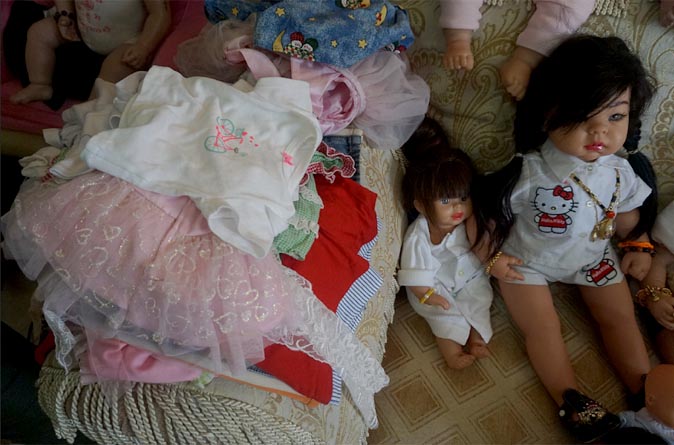
It wasn’t long until she started selling Look Thep at her purse shop in western Bangkok after people offered to buy Petch. She lists dolls for as little as THB1,999 to as high as THB16,000. The expensive ones are the most realistic looking and are imported from the United States.
From there, word spread. Her followers who had “adopted” their own dolls came back with success stories.
“People came to thank me for changing their lives. One couple took a doll, and they won the lottery 17 times in a row. From people with nothing, they now have money,” she said.
Talk to the dolls, and the dolls talk back. Mama Ning said there’s a little telepathy involved. She can hear the dolls in her mind and understand their personalities and needs.
“They’re happy dolls. They have lots of friends and toys,” Mama Ning said. “When I go out, I take them with me. Petch has traveled to Korea with me.”
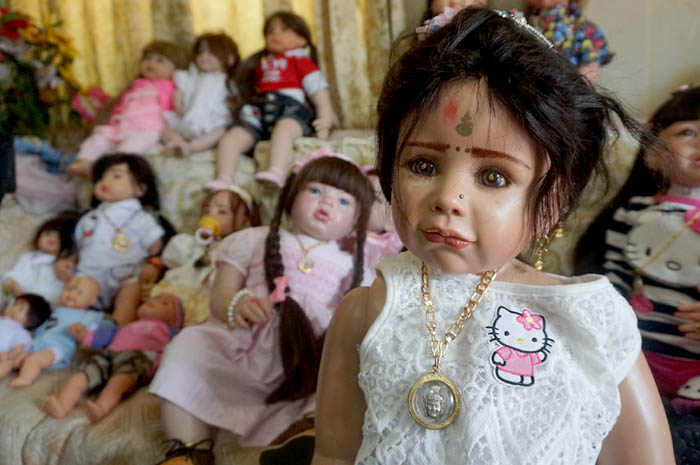
A doll by any other name
Putcharaporn Kuntaku, a 21-year-old student, said her doll “Pailin” helped her get through tough times.
“I had problems at home,” Patcharaporn said as her eyes teared up. “My father died, and I did not get to live with my mom. Maybe it’s all in my imagination, but after I got the Look Thep, I felt like I have someone with me.”
Patcharaporn, who loves dolls and sells some to help pay her school tuition, also credits Pailin with bringing her more customers.
“Most people say Pailin is pretty, just like a real kid,” Patcharaporn said. “Some people give up their seats for me in the bus because Pailin looks so much like a child.”
This convinces Patcharaporn even more that her doll is alive.
“It’s a feeling. We’re here talking about something we cannot see,” she said. “People who love dolls know these are not just normal dolls.”
So is Look Thep just a bizarre update to the idea of the doll, and the needs they satisfy? Could all the superstition just be an excuse to address basic human loneliness? Everyone looks for something or someone to hold on to that they can be sure will never leave. So why not get a weird-looking doll that also picks excellent lottery numbers?
“People look for happiness. They want a better life, luck and wealth,” Mama Ning said. “Their happiness is their interaction with their dolls.”
For some, the dolls can fill a void.
“Some people lost their child. Some never found love, so they came to Look Thep,” she said. “They’re cute and really alive. Then the love blossomed; they want something to hold on to.”
But if Look Thep dolls are alive, is it possible they could also die?
“Do they die? It depends on us,” she shrugged.
